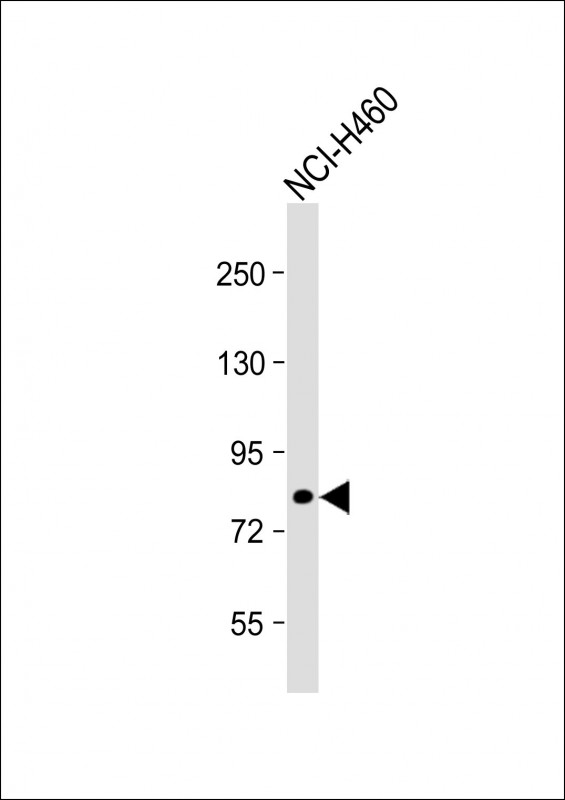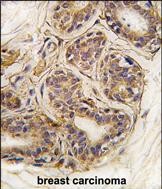CASC3 Antibody (Y181)
Affinity Purified Rabbit Polyclonal Antibody (Pab)
- SPECIFICATION
- CITATIONS
- PROTOCOLS
- BACKGROUND

Application
| IHC-P, WB, E |
|---|---|
| Primary Accession | O15234 |
| Other Accession | A0JMU8, Q8K3X0, Q8K3W3, Q1ECZ4, A5D7H5, NP_619601 |
| Reactivity | Human |
| Predicted | Bovine, Zebrafish, Mouse, Rat, Xenopus |
| Host | Rabbit |
| Clonality | Polyclonal |
| Isotype | Rabbit IgG |
| Calculated MW | 76278 Da |
| Antigen Region | 159-188 aa |
| Gene ID | 22794 |
|---|---|
| Other Names | Protein CASC3, Cancer susceptibility candidate gene 3 protein, Metastatic lymph node gene 51 protein, MLN 51, Protein barentsz, Btz, CASC3, MLN51 |
| Target/Specificity | This CASC3 antibody is generated from rabbits immunized with a KLH conjugated synthetic peptide between 159-188 amino acids from human CASC3. |
| Dilution | IHC-P~~1:10~50 WB~~1:1000 E~~Use at an assay dependent concentration. |
| Format | Purified polyclonal antibody supplied in PBS with 0.09% (W/V) sodium azide. This antibody is purified through a protein A column, followed by peptide affinity purification. |
| Storage | Maintain refrigerated at 2-8°C for up to 2 weeks. For long term storage store at -20°C in small aliquots to prevent freeze-thaw cycles. |
| Precautions | CASC3 Antibody (Y181) is for research use only and not for use in diagnostic or therapeutic procedures. |
| Name | CASC3 |
|---|---|
| Synonyms | MLN51 {ECO:0000303|PubMed:12080473} |
| Function | Required for pre-mRNA splicing as component of the spliceosome (PubMed:28502770, PubMed:29301961). Core component of the splicing-dependent multiprotein exon junction complex (EJC) deposited at splice junctions on mRNAs. The EJC is a dynamic structure consisting of core proteins and several peripheral nuclear and cytoplasmic associated factors that join the complex only transiently either during EJC assembly or during subsequent mRNA metabolism. The EJC marks the position of the exon-exon junction in the mature mRNA for the gene expression machinery and the core components remain bound to spliced mRNAs throughout all stages of mRNA metabolism thereby influencing downstream processes including nuclear mRNA export, subcellular mRNA localization, translation efficiency and nonsense-mediated mRNA decay (NMD). Stimulates the ATPase and RNA-helicase activities of EIF4A3. Plays a role in the stress response by participating in cytoplasmic stress granules assembly and by favoring cell recovery following stress. Component of the dendritic ribonucleoprotein particles (RNPs) in hippocampal neurons. May play a role in mRNA transport. Binds spliced mRNA in sequence-independent manner, 20-24 nucleotides upstream of mRNA exon-exon junctions. Binds poly(G) and poly(U) RNA homomer. |
| Cellular Location | Cytoplasm. Cytoplasm, perinuclear region {ECO:0000250|UniProtKB:Q8K3W3}. Nucleus. Nucleus speckle. Cytoplasm, Stress granule. Cytoplasm, Cytoplasmic ribonucleoprotein granule {ECO:0000250|UniProtKB:Q8K3X0}. Cell projection, dendrite {ECO:0000250|UniProtKB:Q8K3X0}. Note=Shuttles between the nucleus and the cytoplasm in a XPO1/CRM1-dependent manner. Transported to the cytoplasm as part of the exon junction complex (EJC) bound to mRNA (PubMed:15166247). In nuclear speckles, colocalizes with MAGOH. Under stress conditions, colocalizes with FMR1 and TIA1, but not MAGOH and RBM8A EJC core factors, in cytoplasmic stress granules (PubMed:17652158). In the dendrites of hippocampal neurons, localizes to dendritic ribonucleoprotein granules (By similarity) {ECO:0000250|UniProtKB:Q8K3X0, ECO:0000269|PubMed:15166247, ECO:0000269|PubMed:17652158} |
| Tissue Location | Widely expressed. Overexpressed in breast cancers and metastasis, as well as in gastric cancers |

Thousands of laboratories across the world have published research that depended on the performance of antibodies from Abcepta to advance their research. Check out links to articles that cite our products in major peer-reviewed journals, organized by research category.
info@abcepta.com, and receive a free "I Love Antibodies" mug.
Provided below are standard protocols that you may find useful for product applications.
Background
Component of the dendritic ribonucleoprotein particles (RNPs) in hippocampal neurons. May play a role in mRNA transport.
References
Macchi,P., J. Neurosci. 23 (13), 5778-5788 (2003)
Degot,S., Oncogene 21 (28), 4422-4434 (2002)
If you have used an Abcepta product and would like to share how it has performed, please click on the "Submit Review" button and provide the requested information. Our staff will examine and post your review and contact you if needed.
If you have any additional inquiries please email technical services at tech@abcepta.com.













 Foundational characteristics of cancer include proliferation, angiogenesis, migration, evasion of apoptosis, and cellular immortality. Find key markers for these cellular processes and antibodies to detect them.
Foundational characteristics of cancer include proliferation, angiogenesis, migration, evasion of apoptosis, and cellular immortality. Find key markers for these cellular processes and antibodies to detect them. The SUMOplot™ Analysis Program predicts and scores sumoylation sites in your protein. SUMOylation is a post-translational modification involved in various cellular processes, such as nuclear-cytosolic transport, transcriptional regulation, apoptosis, protein stability, response to stress, and progression through the cell cycle.
The SUMOplot™ Analysis Program predicts and scores sumoylation sites in your protein. SUMOylation is a post-translational modification involved in various cellular processes, such as nuclear-cytosolic transport, transcriptional regulation, apoptosis, protein stability, response to stress, and progression through the cell cycle. The Autophagy Receptor Motif Plotter predicts and scores autophagy receptor binding sites in your protein. Identifying proteins connected to this pathway is critical to understanding the role of autophagy in physiological as well as pathological processes such as development, differentiation, neurodegenerative diseases, stress, infection, and cancer.
The Autophagy Receptor Motif Plotter predicts and scores autophagy receptor binding sites in your protein. Identifying proteins connected to this pathway is critical to understanding the role of autophagy in physiological as well as pathological processes such as development, differentiation, neurodegenerative diseases, stress, infection, and cancer.



